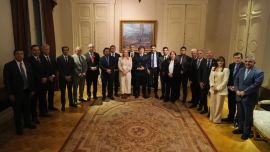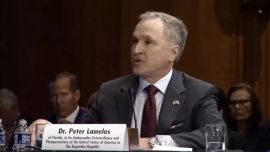Alberto Fernández says that all Mauricio Macri has managed to do during his term of office is impoverish five million more Argentines by destroying jobs and encouraging inflation. He wants voters to believe his rival’s priority is to make his rich cronies even richer. Many already agree with him. They overlook the expansion of welfare programmes under Macri’s government and take it for granted that if well over a third of the population now scrapes a living below the poverty line, it must be because the country’s rulers are a mean-minded lot who feel little sympathy for the less fortunate.
They would have us think that the huge problem posed by large-scale poverty can be solved by giving power to good people like themselves who are really determined to help their fellow beings, something they will do by handing them money, decent jobs, food and whatever else they may happen to need. Anyone who asks just how much all this generosity would cost and who would foot the bill is assumed to be a neoliberal who cares more for numbers than for people of flesh and blood. As for those who think welfare programmes have their place in a civilised society but that unless they are supplemented by a great deal else they only perpetuate poverty, they rarely get listened to.
Shedding tears over the plight of the poor, who could soon be in the majority, may be emotionally satisfactory for those who indulge in it and, while on the campaign trail, making out that one is the soul of benevolence can be relied upon to bring in extra votes, but it does nothing to make life better for people who often go hungry to bed. Like it or not, their future, which the way things are going will in all likelihood be even bleaker than their present, will continue to depend on the country’s overall economic performance which, in turn, will depend in part on their own efforts.
If Argentina goes under, as she well could in the coming months, the number living in poverty will swell mightily as it did in Venezuela where misrule by Hugo Chávez and his successor Nicolás Maduro gave rise to a mass exodus comparable to that of war-torn Syria. Though it is hard to imagine that millions of Argentines could one day feel they had no choice but to do the same and seek refuge across the border in Chile, Paraguay, Bolivia, Brazil and Uruguay, if a disaster like Venezuela’s came about, many of the most talented would be almost certain to leave for Europe, North America or Australia, thereby depriving the country of the people it would need if it is to leave underdevelopment behind.
No government anywhere has managed to eliminate poverty entirely, but many have succeeded in making it a marginal phenomenon, as it is in much of Western Europe where the official poverty line is far higher in absolute terms than it is here, which is why members of Cristina Fernández de Kirchner’s government could go out on a limb by saying that when they ruled the roost, the situation here was less dire than in Germany. Even so, in Western Europe, the United States and Japan, a hard core of poverty of five percent or so persists despite expensive efforts to deal with it.
Their example is disheartening. If rich, welladministered, highly-productive countries, most of them long characterised by a robust work ethic, have failed to eliminate poverty, what chance does Argentina have of making a dent in it? Here it has long since ceased being a problem restricted to a fairly small number of individuals who can either be left to live off welfare or, if they are in trouble because of their personal traits, be coaxed into modifying their behaviour.
Well over 10 million people have acquired the habits and outlook typical of what sociologists call the “culture of poverty,” which they are bequeathing to their sons and daughters. In some parts of the country, families in which members belonging to three or four generations have never held a steady job are thick on the ground.
As there are so many of them, on election day their views, and those of the leaders of organisations that allegedly represent them, matter every bit as much as those of the rest, so it is not at all surprising that Argentina’s “political culture” bears an increasing resemblance to the one shaped by poverty in which immediate necessities are thought to be far more important than anything to do with long-term objectives. If you are very hungry, barbecuing the hen that, according to its owner will one day start laying golden eggs, will strike you as a sensible proposition.
Few politicians dare suggest that the now “structurally poor”, whose life has always been much as it is now, are largely to blame for their own fate. One who does is Mauricio Macri’s running-mate, Miguel Ángel Pichetto, who keeps pointing out that their unwillingness to do the jobs that let recently arrived Venezuelan immigrants earn a living means that most of the men and women who in exchange for a bite to eat take part in protest rallies, are work-shy. As a result of such remarks, Pichetto is finding himself typecast as a crusty right-wing reactionary who likes nothing better than “blaming the victim”.
Telling the poverty-stricken they should pull themselves together may seem grossly unfair, but that is precisely what the ruling elites in East Asia – where the “war on poverty” is going far better than it is here – have long been fond of doing. As in parts of Europe and in North America in the benighted past when what Max Weber called the “Protestant ethic” held sway, the Koreans, Chinese and Japanese have a Confucian version of it which puts the stress on every individual’s duty to make a positive contribution to society’s well-being.
They also take education very seriously indeed; in China,
desperately poor parents will sacrifice almost everything to
make sure their children learn as much as is humanly possible,
and inculcate into them the belief that they are honour-bound
to repay their devotion by striving to meet their expectations.
If anecdotal evidence is anything to go by, such attitudes are
not exactly common in Argentina where even the kids who do
not drop out, as half do, long before finishing secondary school,
learn far less than their East Asian counterparts. Unless this
changes, the local edition of the “war on poverty” will continue
to be only something politicians are eloquent about when elections are in the offing. related news





















Comments